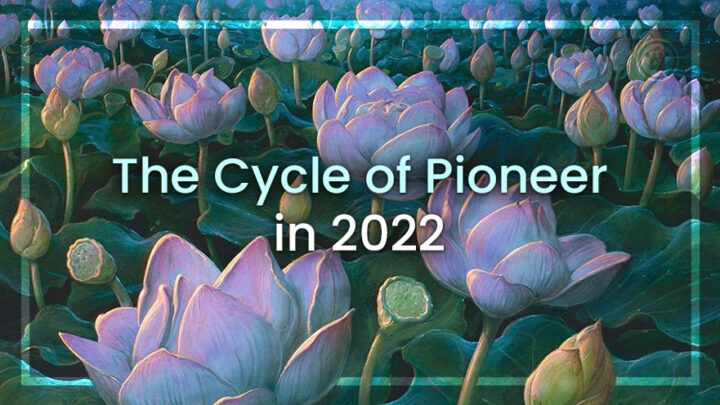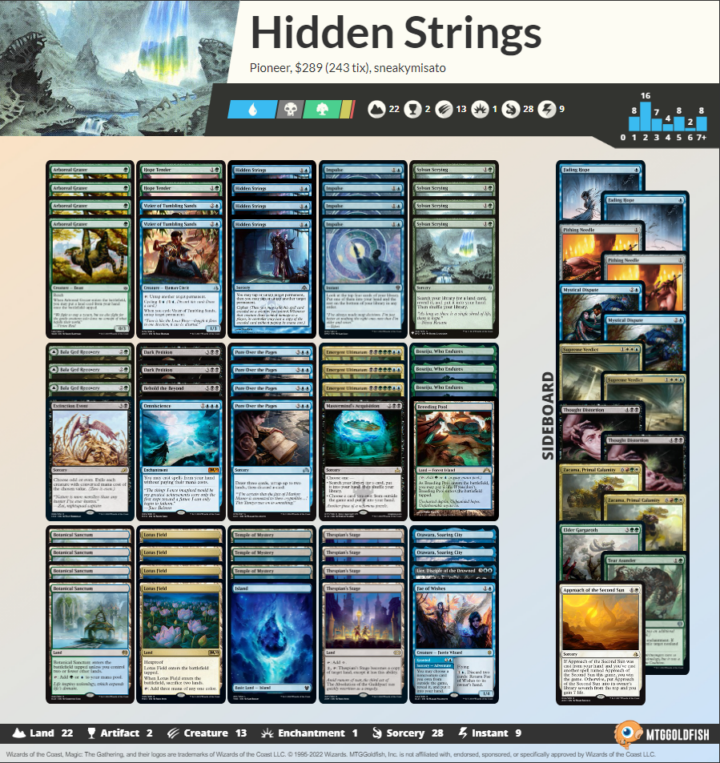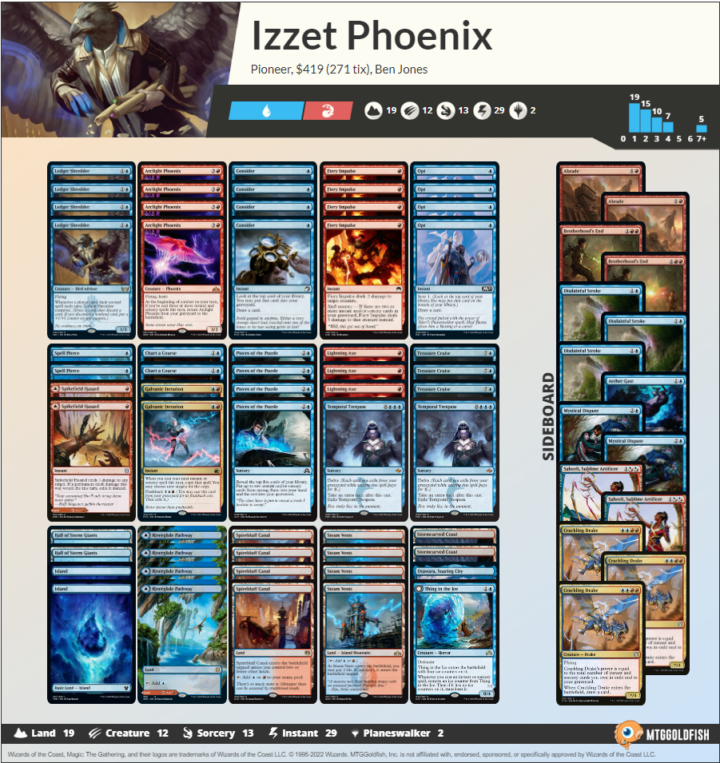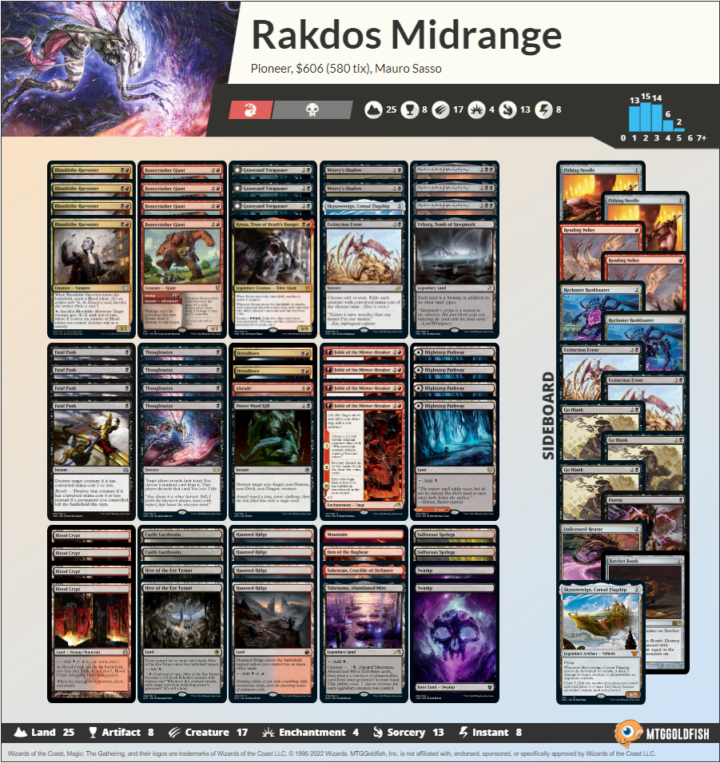We as magic players love to have all the answers. How often have you heard players say, “Oh this deck isn’t good,” or, “This deck needs a ban,” only to have time prove them wrong? Magic players are really good at finding a thing that works and then saying, “why play something else?”
This is a totally reasonable stance for most players — those who just want to succeed at their level of play and don’t want to push further. After all, it’s a lot of work to get that huge edge on the player base and figure decks out.
But sometimes all you need to do is look backward to know what you should be playing next week. Formats often end up in circles like this, where the meta develops until it wraps around on itself.
In fact, Pioneer has found itself in this sort of cycle throughout all of 2022. So as we think about how far we’ve come this past year, let’s look for this trend and see whether the end point is actually right where we started.
Playing the Field
From late 2021 into early 2022, Lotus Field was doing very well in Pioneer. We saw it succeed on Magic Online in challenges, and players didn’t feel the pressure of organized play incentives despite many opponents making some effort to prepare for the deck. This led to some decks succeeding that maybe shouldn’t have (looking at Niv to Light, here).
Fast forward to the announcement of the Regional Championship Qualifier season 2 months later. Players were low on Lotus Field because Mono Green Devotion was on the rise, and the deck plays Damping Sphere with Karn, the Great Creator to find it.
So then players were “off lotus field,” and it would stay that way until just the other week when players decided to innovate the Lotus Field deck. Adding multiple cards, like Pithing Needle, helped combat this problematic matchup.
When combined with the green players removing Damping Sphere thanks to new tools from The Brothers’ War, Lotus began rising back up as a part of the metagame. After all, not only had green slacked on the hate, but most decks had nothing hard targeting this hyper efficient combo.
During the last three weekends of events, the deck has crushed everywhere, putting up consistent top performances. The deck even won the Magic Online Championship Qualifier and Pro Tour Qualifier split event this past weekend in the hands of Cain Rianhard.
Seeing the problem of Aggro decks on the rise (and recognizing a lack of answers in previous lists) Rianhard added more wraths for protection and Hope Tender to create more explosive draws if need be.
Rianhard had seen the cycle of players not respecting Lotus Field unfold and switched to the hyper powerful, albeit fragile, combo deck with the hopes that others would stay the course for one more weekend. Their call was right, and now we have another great finish for Lotus Field.
Phoenix Rises
Before we get caught up all the way to the current day, if you look back again at the start of 2022, you’ll see another deck completely dominating events: Arclight Phoenix. This deck was one of the best in Pioneer at the time and consistently dominated events.
In fairness, it did have Expressive Iteration at that time. But once that card was banned, players dropped the deck en masse as an untenable choice. It had lost too powerful a card and had too many “problems” in its absence.
Phoenix stayed in that category until our now world champion, Nathan Staur, brought the deck to the Magic Online Championship and absolutely wrecked the field. Staur did what needed to be done and put work in to fix a deck that had problems instead of switching lists in resignation.
This led to great success for Staur, yet players still disrespected the Arclight deck. But fast forward to Dreamhack Atlanta and you saw Arclight turn out to be one of the best performing decks of the weekend, well prepared for the metagame at large. I played the deck myself and locked up my Pro Tour invite in the process.
You can see that a deck has flaws and weaknesses, recognize they are (at least temporarily) surmountable and overcome them to succeed. Even if, long term, decks can adapt and beat you, you’re only playing the event in front of you. The future doesn’t matter, yet.
Recalibrating Rakdos
Rakdos players are operating on a much shorter timeline than we have seen across the rest of today’s history dive, but they have lived out this same cycle all the same.
We just talked about how Phoenix had some great weekends, and this was, in part, because Rakdos players were not prepared for Phoenix ahead of time. Cards like Go Blank are heavy hitters that can completely undo the Phoenix player’s set up, but they went unplayed.
This led to a hole in the matchup they had previously solved. So, the players learned from the past and put Go Blank back into their sideboards, effectively correcting for the metagame shift. This resulted in multiple, dominant performances in multiple regions for Rakdos Midrange players. The Japanese Regional Championship even had six players in the top 8! Prolific Rakdos streamer and innovator Missplaced Ginger also top 4’ed the first Canadian RC.
End Step
A big part of learning from the past is not just finding the right weekend to exploit some old hole in the metagame, but to see what stopped those decks and adapting your current game plan to account for those strategies. Yet, much like life, Magic metagames are a circle. They repeat and churn, with players churning out innovations that allow old threats to rise up. We have countless examples of this in Magic’s history, but events in 2022 perfectly encapsulated this notion.
Now we are seeing Rakdos players adapt to their surroundings and start metagaming for the decks like Phoenix and Lotus Field again, which is part of what pushed them out of the format to begin with.
However, a time will come where sleeving back up the Arclight and Lotus Field decks will be the right call. That is what a healthy metagame looks like. Decks rise up, forcing the world to adapt and knock them off their pedestal. So going into 2023, are you going to let others topple you or put in the work to stay on top?

Mason Clark is a grinder in every corner of the game who has played at the pro level and on the SCG Tour with Team Nova. Whether he’s competing in Standard, Historic or Modern, Mason plays with one goal in mind: to be a better player than he was the day before. Check out his podcast, Constructed Criticism, and catch his streams on Twitch.




